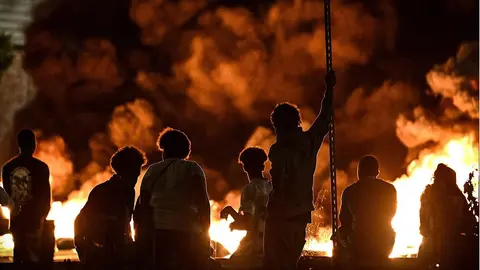France in flames

In barely five days of riots, attacks, looting, arson, theft and attacks on schools, colleges, town halls, transport and public buildings in France, the toll of destruction far exceeds the three weeks in 2005 when the government of then president Jacques Chirac had to deal with the explosion of the "banlieues", the shantytowns on the outskirts of the big cities, where a large part of African immigration is concentrated.
This time the tone of the incidents has been raised to the point of becoming a real challenge to the state. On this occasion, the event that set the fuse alight was the death of a seventeen-year-old Maghrebi youth, who was shot by a policeman when he failed to stop at a checkpoint. Once again, the accumulated rage of individual and collective frustrations has exploded with great violence, spilling over the supposed limits of these marginalised neighbourhoods to destroy the very centre of large and medium-sized cities.
In this gradation of crazed violence and destruction, new and disturbing features appear. The bulk of the thousands of people involved in these events are teenagers between the ages of thirteen and seventeen, most of whom come from broken homes where parental authority has disappeared. From the confessions obtained after the hundreds of arrests made, it is clear that these young people act with no other motivation than to upload videos of their "exploits" to the networks, sometimes adding to them the day's accounts: so many cars burnt, so many shop windows smashed and so many police officers assaulted that they have had to be evacuated to hospital.
For the first time, there is a reiteration in their statements that they do not feel at all like citizens of France, even though they are already in their third or fourth generation and therefore natives of the country that welcomed their grandparents in the middle of the last century. This is a chilling fact, insofar as they base on this renunciation the destruction of the schools and lycées in which they are supposedly trained in the republican values of liberty, equality and fraternity, thus imbibing the French and, by extension, European identity.
If the school has ceased to be a sacred and respectable place for these children of immigration, they have also broken with the egalitarian symbol of power, the one that manifests itself in the town halls and is embodied in their mayors and councillors. Of all the attacks on these democratically elected representatives of the people, the most serious has been that suffered by Vincent Jeanbrun, mayor of L'Haÿ-les-Roses, in the department of Val-de-Marne. As a battering ram, the attackers hurled a burning vehicle at his home, the impact of which seriously injured his wife and daughters. President Emmanuel Macron will receive him at the Elysée Palace on Tuesday, along with 219 other mayors of cities devastated by the vandalism.
In the debates sparked by this new wave of violence, criticism of France's immigration integration policies has resurfaced. Even for those who defend the goodness of the system, there is a clear failure in that these new generations do not feel French, despise republican values and consequently reject national identity. The seriousness of the problem is accentuated by the fact that there is still no agreement in the EU to establish a uniform policy on immigration, just when it is most urgent.
The far left, embodied by the leader of La France Insoumise (LFI), Jean-Luc Melénchon, has been the only political force that has not calmed down, but has instead exacerbated its criticism of the police, accusing them of racism and trigger-happy behaviour. At the same time, the extreme right is blaming the failed integration policies. Macron, who represents the centre, is reluctant to decree a state of emergency, a measure demanded, rather than suggested, by the conservative Republican Party (LR).
If the most urgent thing is to stop this spiral of violence and destruction, the immediate thing will be to find a solution to a problem that threatens not only to dissolve France but the European Union itself. And it is so serious that it cannot be left to the temporary convenience of the politicians in office. There is therefore an urgent need for agreed and coordinated measures to prevent France's flares from setting fire to the whole of Europe.


